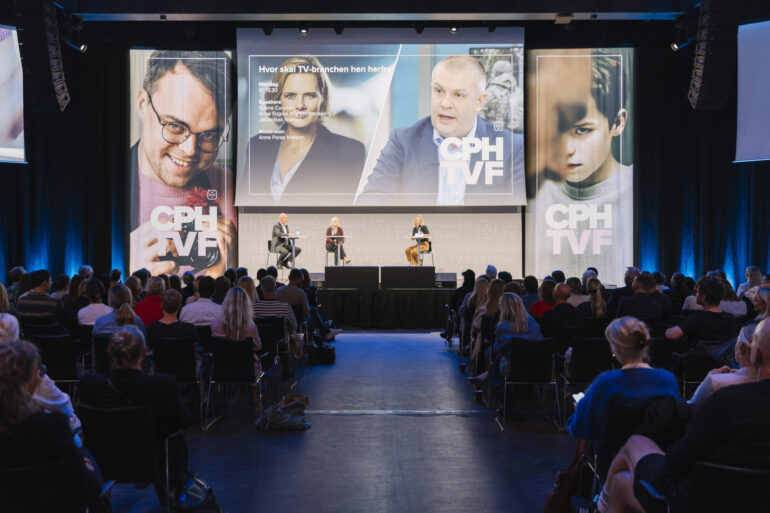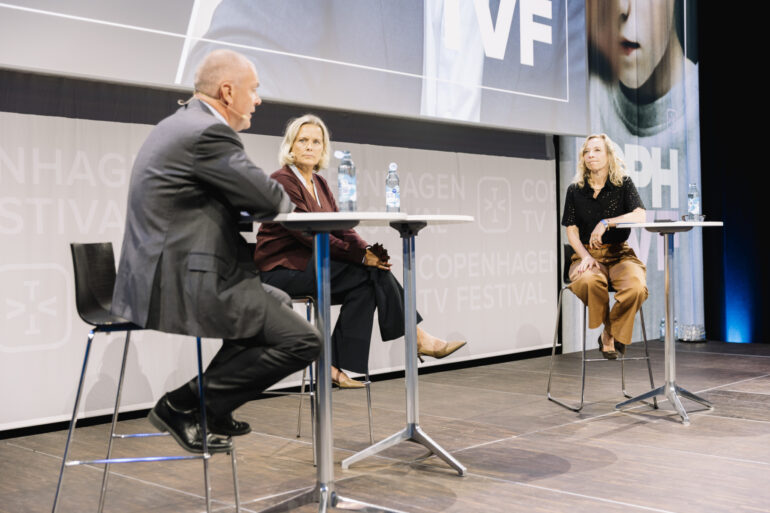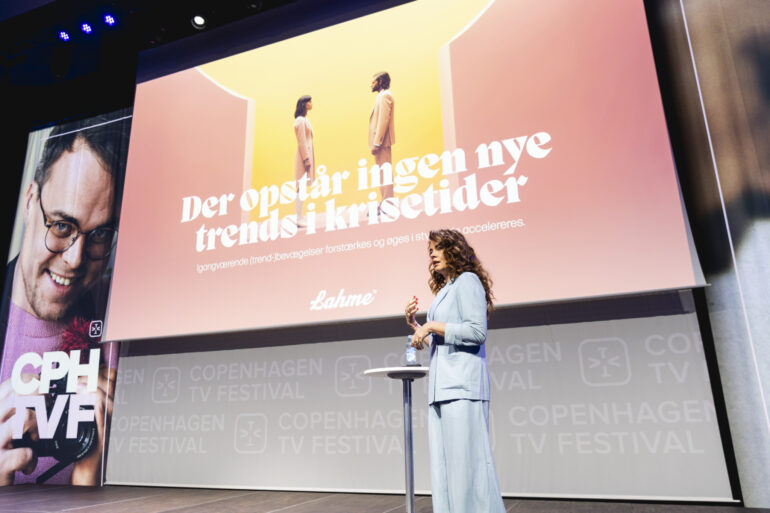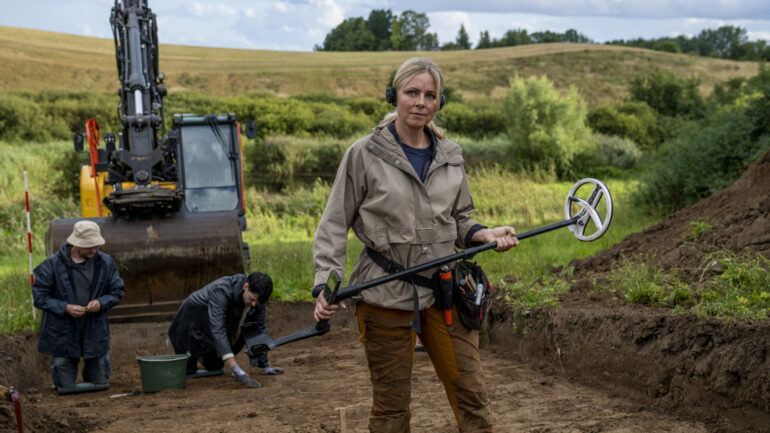Written by: Eva Novrup Redvall
28.08.25
The 25th Copenhagen TV Festival explored current challenges and future opportunities, while broadcasters presented new series and strategies for the coming years with a record Nordic attendance.
On august 25-26, the Copenhagen TV Festival, organised by the Danish Producers’ Association, celebrated its 25th anniversary with a special line-up of acclaimed international guests like US television executive Robert Greenblatt, UK showrunner Sally Wainwright, and Adolescence director and cinematographer Philip Barantino and Matthew Lewis,plus a range of industry analysts and experts. As always, the packed schedule also addressed national and international market trends, and what Danish broadcasters and streamers are looking for in scripted fiction. This year, the programme wasn’t livestreamed or available for later viewing on demand. One had to be on site to take part in the many sessions, which were organised into four content tracks rather than one overall theme.
Moving across panels and presentations focusing on scripted fiction, one did, however, get the sense of the recurring topic of how to balance change and continuity, with a special emphasis on the issue of innovation. Several panels addressed how Nordic broadcasters have now consolidated themselves in a streaming era, but what comes next? How does one balance building on well-functioning strategies and moving forward by developing new and innovative productions? The issue of what was repeatedly presented, as much needed innovation was continuously discussed in sessions pointing to how this is not only about creating new content, but also about developing approaches and structures that facilitate the emergence of new ideas across idea development, production and distribution and/or business models.
Upcoming DR and TV 2 strategies for 2030
Newly appointed Director General of DR Bjarne Corydon and CEO of TV 2 Anne Engdal Stig Christensen addressed this balancing act in a session focused on the state of the current television landscape, where both DR and TV 2 are in the process of finalising their strategies for 2030. In another session, TV 2’s Head of Content Lotte Lindegaard highlighted how TV 2 (set to launch their strategy in October) is not the least concerned about the fact that audiences under the age of 40 spend 75% of their time on external platforms in a media landscape where traditional television viewing is declining and streaming numbers stagnating. The question of how to reach young audiences was an issue across many sessions that tried to offer inspiration on how to meet them on Roblox (gaming and community platform) or investigated possible lessons to be learned from successful YouTube initiatives and popular influencers.
In terms of innovation, several sessions explored how it might be fruitful for the Nordic television industries to not only look to international television players and platforms as sources of inspiration, but also to other fields and formats. One panel suggested that this could be podcast production, where cheaper and quicker production processes more easily allow for risk-taking, talent development, and commissioning open-ended content where listeners can feel invited on a joint and intimate exploratory journey, rather than having the sense of everything being already settled when pressing play in scripted fiction. Discussions also focused on the value of allowing for failure, and on working with innovation labs and more focused talent training in other industries.
AI in action and audience trends
Working with AI had a separate track, with both hands-on sessions trying out real-time format development and media analysts like Keld Reinicke outlining current trends and trajectories. However, trend analyst Julia Lahme argued that the coming years need people with creative intelligence to counter AI in a time when people are tired of being reduced to consumers and would rather like to participate or (co-)create. Lahme also stressed how traditional segmentation tools are challenged, since many people no longer feel or act their age, making it harder to put people in boxes and predict audience behaviour.
While many sessions thus focused on new trends and market changes to consider moving forward, most of the international guest speakers seemed to insist that talented creatives with engaging passion for their ideas and excellent storytelling are still at the core of it all if one is to create hit shows like Happy Valley or Adolescence. This point was also raised in the session on the Swedish Netflix show Diary of a Ditched Girl (Halva Malmö består av killar som dumpat mig), premiering on September 11, bringing together author Amanda Romare, creator Moa Herngren, and director Emma Bucht for a vivid conversation on how to transform real-life experiences into a scripted series.
Nordic news and broadcaster outlooks
Having a shared history and set of values across the Nordics was an important common ground highlighted in the many discussions of the specificity of Nordic public service content and possibilities for further collaborations. The panel on what commissioners are currently looking for in the Danish television market opened with Pil Gundelach Brandstrup, Head of original production networks and streaming for Warner Bros. Discovery in the Nordics, sharing that after HBO Max went back to looking for Nordic commissions they had received hundreds of pitches across the Nordics and now has several projects in development (with expected greenlight for the first during the fall). The plan is to focus on crime/thriller/drama fiction with the overall ambition of producing two series in Sweden and two in Denmark per year. With the reembracing of the HBO brand, Brandstrup emphasized how the focus was on strong storytelling with an edge and the quality to also have a wider appeal. Several of the series in development consist of six episodes. As Brandstrup stressed, short and sharp is good, but it’s great if there is also the possibility for more seasons.
New DR series – and a US remake
Head of Fiction and Development at DR Henriette Marienlund presented how the Danish PSB still produces 70% of their scripted series inhouse, among them the eight-episode family drama Harvest (Høst), which was just announced for 2026, written and directed by Martin Zandvliet (Oscar-nominated for Land of Mine (Under sandet)) and part of the New8 collaboration between eight European public service broadcasters launched in 2023. However, there are also externally produced series like The Uniform (Uniformen) (Miso Film, set for 2026) with a police academy as the arena, and Even in the Best of Families (De bedste familier, Apple Tree Productions, set for 2027) based on a book by Kim Blæsbjerg in the pipeline, the latter written by screenwriter Maja Jul Larsen, whose DR series Cry Wolf (Ulven kommer) was recently sold for a FX remake headed by Sarah Treem. When asked about possible collaborations with international streamers in the style of Borgen: Power and Glory (Borgen) with Netflix, Marienlund stressed that DR had appreciated that collaboration, but only ventured into these partnerships under the right circumstances, since the main focus is always on the national audiences.
Balancing new seasons and series
While the current DR strategy was presented as balancing more experimental dramas like Generations (Generationer) and series with more mainstream appeal (like Carmen Curlers with its third and final season on DR from September 26), Mette Nelund from TV 2 presented one of her main tasks as balancing long-running hit shows like The Seaside Hotel(Badehotellet), which ended in 2024 after ten seasons, and new commissions. In 2025, TV 2 audiences have appreciated new series like The Excavation (Danefæ), presented as “a marriage drama in an archaeological setting”, and the drama The Lie (Løgnen), set among social and health assistants. Nelund explained how the plan is to continue having a mix of different series marked by a fundamental sense of hope, and be able to offer new Danish scripted fiction all year round, as is currently the case.
Plenty of challenges for the coming years…
While there was still the sense of a pressured industry – and critical questions asked about the future of public service broadcasting and the overall state of the Nordic television industries five years down the line – the Copenhagen TV Festival was marked by an overall sense of approaching change as a possibly productive challenge, and trying to make the best of it. However, across all the inspirational talks, debates and discussions on innovation, the festival also made it clear that there are definitely plenty of changes and challenges to work with in the coming years, in overall broadcaster strategies as well as in the everyday work of making new shows across platforms and professions.




